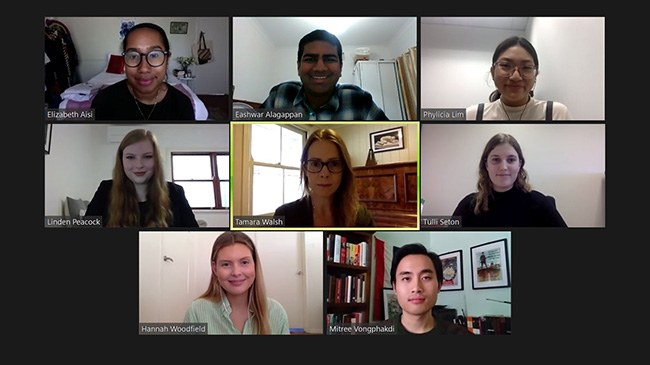
Legal professionals, journalists and researchers now have access to a new-and-improved version of the Deaths in Custody Project – the first comprehensive national database of its kind.
Launched in 2018 by The University of Queensland Law School, the database collects and records information from published reports of deaths in custody across all Australian states and territories.
The pro bono project is staffed by a team of UQ law student volunteers with significant contributions from academic and IT staff.
Project founder and director Professor Tamara Walsh said the upgraded national database was “critical” for ensuring transparency within the corrections system.
“At this moment in time there is increased attention on deaths in custody, particularly Indigenous deaths in custody,” Professor Walsh said.
“Tragically, deaths in custody happen all the time and more often than people think.
“However, information on many of these cases is unknown to the community because it isn’t publicly accessible and coroners in each state and territory publish their data separately.
“We have been working for years to bring this information together in one place.”
Professor Walsh said the new database was more user-friendly and up to date, with almost 200 cases added since 2016.
“We have improved the search function to allow users to open each case in a new tab without losing their previous research results,” she said.
“Each case has a unique ID record, which will help users find specific cases again for further investigation.
“The changes to the database will ensure anyone can get accurate and up-to-date information on deaths in custody as coroners’ inquest reports are released.”
The research work for the project is undertaken by law students, who collate and analyse information from coronial inquest findings across Australia.
To date, the database contains information on almost 700 deaths in custody spanning from 1991 to the present.

Student leader Eashwar Alagappan said he joined the project to assist some of the most vulnerable members of the community – people in correctional facilities.
“This project is really special as it provides a voice to individuals who traditionally may not receive a lot of public support when they have been treated unfairly,” Mr Alagappan said.
“The concerns about the treatment of Indigenous people in custody in Australia, which sparked the Royal Commission into Aboriginal Deaths in Custody from 1987 to 1991 and the recent Black Lives Matter movement in America highlight the importance of making data like this accessible to all.”
Significantly, the project team’s analysis of cases thus far showed coroners’ recommendations were not being implemented.
“Coroners have expressed frustration about this issue,” Professor Walsh said.
“We have also found that reports often fail to mention whether the person who died was Indigenous or not, making it difficult to determine the rate of Indigenous deaths in custody.
“We hope our database will continue to push those in power to accurately account for deaths in custody and ensure justice is served for the deceased.”
Professor Walsh said the new-and-improved database was a testament to the hard work of students and staff across UQ.
“I would particularly like to thank Joshua Hartmann, Senior Web Applications Developer from UQ Business School and Leslie Elliott, Manager of Research Infrastructure for UQ ITS, for working tirelessly over the years and doing it all pro bono,” she said.
“I also want to thank the talented and diligent students currently involved with the Deaths in Custody Project: Elizabeth Aisi, Eashwar Alagappan, Isaac Gill, Thilini Joseph, Phylicia Lim, Linden Peacock, Tulli Seton, Sylvia May Stuen-Parker, Mitree Vongphakdi, Maddy Waldby, Christopher Wong and Hannah Woodfield.
“I’m proud to lead these collaborations across departments on a project that is truly making a difference.”
Find out more about the Deaths in Custody Project.
Photo credit for header image: Photo by Emiliano Bar on Unsplash.
Media: Professor Tamara Walsh, t.walsh@law.uq.edu.au; Faculty of Business, Economics and Law communications team, media@bel.uq.edu.au, +61 409 612 798.



